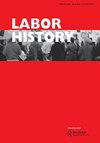A trade unionism of resistance: the dissidence of the orthodox communists in CCOO (1970-1989)
IF 0.7
4区 管理学
Q1 HISTORY
引用次数: 0
Abstract
ABSTRACT The Czechoslovak crisis of 1968 resulted in the birth of a new phenomenon within Spanish communism. The criticism of the USSR, together with the gradual ideological and tactical moderation of the Communist Party of Spain, provoked the irruption of an internal dissidence whose common nexus was to vindicate the orthodoxy of identity. They were misnamed ‘pro-Soviets’ for their support of socialist camp. A particularly workerist current which developed its repertoires of socialization within the Comisiones Obreras trade union in a preeminent way. This article analyzes the trajectory of their trade union action throughout the 1970s and 1980s. For this purpose, and based on oral and newspaper sources, we examine their ideas, representations and symbols within this important social movement.抵抗的工会主义:中国共产党的正统共产主义者的异议(1970-1989)
摘要1968年的捷克斯洛伐克危机催生了西班牙共产主义内部的一种新现象。对苏联的批评,加上西班牙共产党在意识形态和战术上的逐渐温和,引发了内部异见人士的爆发,他们的共同关系是维护身份的正统性。他们因支持社会主义阵营而被误称为“亲苏联”。一股特别的工人主义潮流,以卓越的方式在奥夫雷拉斯委员会工会内部发展了其社会化的剧目。本文分析了20世纪70年代和80年代他们工会行动的轨迹。为此,基于口头和报纸来源,我们研究了他们在这场重要的社会运动中的思想、表现和象征。
本文章由计算机程序翻译,如有差异,请以英文原文为准。
求助全文
约1分钟内获得全文
求助全文
来源期刊

Labor History
Multiple-
CiteScore
1.00
自引率
28.60%
发文量
44
期刊介绍:
Labor History is the pre-eminent journal for historical scholarship on labor. It is thoroughly ecumenical in its approach and showcases the work of labor historians, industrial relations scholars, labor economists, political scientists, sociologists, social movement theorists, business scholars and all others who write about labor issues. Labor History is also committed to geographical and chronological breadth. It publishes work on labor in the US and all other areas of the world. It is concerned with questions of labor in every time period, from the eighteenth century to contemporary events. Labor History provides a forum for all labor scholars, thus helping to bind together a large but fragmented area of study. By embracing all disciplines, time frames and locales, Labor History is the flagship journal of the entire field. All research articles published in the journal have undergone rigorous peer review, based on initial editor screening and refereeing by at least two anonymous referees.
 求助内容:
求助内容: 应助结果提醒方式:
应助结果提醒方式:


